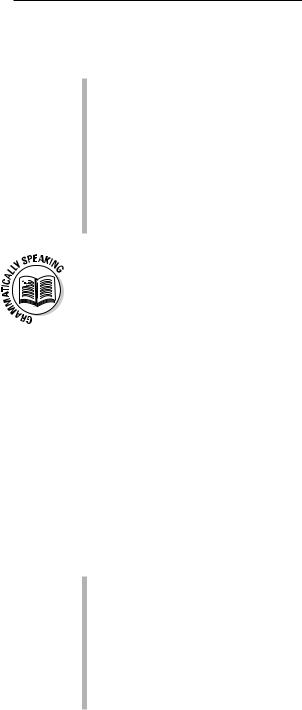
- •About the Authors
- •Dedication
- •Acknowledgments
- •Table of Contents
- •Introduction
- •About This Book
- •Conventions Used in This Book
- •Foolish Assumptions
- •How This Book Is Organized
- •Icons Used in This Book
- •Where to Go from Here
- •The French You’re Familiar With
- •Idioms and Popular Expressions
- •Key Parts of Speech
- •Cavorting with Verbs
- •Forming Sentences and Questions
- •The French Alphabet
- •Uttering Vowel and Consonant Sounds
- •Greetings: Formal and Friendly
- •Asking Questions to Get to Know People
- •Counting Your Lucky Stars: Numbers
- •Using the Calendar and Dates
- •Telling Time in French
- •Discussing Where You Live with the Verb “Habiter”
- •Discussing Daily Routine with Reflexive Verbs
- •Using Possessive Adjectives to Introduce Your Family Members
- •Basic Questions and Polite Expressions
- •Stating Your Preferences
- •Talking about Your Livelihood
- •Chatting about the Weather
- •Deciding to Keep in Touch
- •Getting Direction about Directions
- •Dining Out
- •Going to the Market
- •Going Shopping
- •Going Out with the Verb “Sortir”
- •Having Fun with the Verb “S’amuser”
- •Oh, the Places You’ll Go!
- •Making Plans with Friends
- •Making a Phone Call
- •Livin’ in the Past: Using the Past Tense
- •Playing Sports and Games
- •Going to the Beach
- •Setting Up Camp
- •Enjoying Quieter Pursuits
- •Where Do You Want to Go?
- •Getting Ready for Your Trip
- •Getting Current with Currency
- •Going to the Bank
- •Using Credit Cards and ATMs
- •Getting through the Airport
- •Navigating Buses, Trains, and Subways
- •Getting Around by Car
- •Finding Accommodations
- •Checking In to a Hotel
- •Checking Out of a Hotel
- •Getting Help Fast
- •Getting Medical Help
- •Handling Legal Matters
- •Label the Things in Your House
- •Write Your Shopping Lists in French
- •Listen to French Music
- •Watch French Movies
- •Tune in to TV5
- •Read French Publications
- •Take a Class
- •Join a French Association
- •Join an Online Chat or Pen Pal Forum
- •Using “Tu” When You Mean “Vous”
- •Using “Bonne nuit!” for Good-Bye
- •Using “Garçon” or “Porteur” to Address Service Staff
- •Saying “Je suis excité(e)” to Indicate Excitement
- •Saying “Je suis chaud(e)/froid(e)” to Say You’re Hot or Cold
- •Saying “Je suis plein/e” to Mean You’re Full
- •Using “de la glace” to Request Ice
- •Using “Je suis . . . ans” to Tell Your Age
- •Asking for Change with “J’ai besoin de change”
- •Using the Verb “Visiter” in Reference to People
- •“À mon avis”
- •“C’est pas vrai”
- •“Avec plaisir”
- •“C’est génial”
- •“À votre santé”
- •“À vos souhaits”
- •“Quelle horreur!”
- •“À bientôt”
- •“Passez-moi un coup de fil!”
- •“On y va!” or “Allons-y!”
- •“Je n’en sais rien”
- •“Je n’en reviens pas”
- •“Ça vaut la peine”
- •“C’est pas grave”
- •“N’importe”
- •“Tu cherches midi à 14h”
- •“Prenons un pot!”
- •Regular French Verbs
- •Auxiliary French Verbs
- •Track Listing
- •Customer Care
- •Index

Chapter 16: Finding a Place to Stay 271
would call down to the desk and say Il nous faut. . . . (eel nooh foh. . . .) (We need. . . .) and add the articles from the following list, as appropriate:
une/des couverture(s) (ewn/dey kooh-vehr-tewr) (a blanket/blankets)
un/des oreiller(s) (uhN/dey-zoh-reh-yey) (a pillow/pillows)
une/des serviette(s) (ewn/dey sehr-vee-eht) (a towel/towels)
des cintres (dey sahN-truh) (hangers)
une/des ampoule(s) (ewn/dey-zahN-poohl) (a light bulb/light bulbs)
du savon (dew sah-vohN) (soap)
du papier hygiénique/de toilette (dew pah-pyey ee-zhee-ey-neek/duh twah-leht) (toilet paper)
In Chapter 7, we discuss the impersonal expression il faut (eel foh) (it is necessary) followed by the infinitive. However, you can personalize this construction by adding an indirect object pronoun of your choice in front of the verb: me (muh) (to me), te (tuh) (to you), lui (lwee) (to him/to her), nous (nooh) (to us), vous (vooh) (to you), and leur (luhr) (to them). (Check out the indirect object pronouns in Chapter 13.) Look at the following examples but note that you cannot translate these examples literally:
Il me faut des serviettes. (eel muh foh dey sehr-vee-eht.) (I need towels.)
Il nous faut du savon. (eel nooh foh dew sah-vohN.) (We need soap.)
Checking Out of a Hotel
For whatever reason, the checkout time is hardly ever convenient, but you probably realize that rooms have to be cleaned before the next guest arrives. Of course, before leaving, you have to pay your bill or at least verify it to see whether you have accrued any additional charges during your stay. The following phrases can come in handy when it’s time to check out:
À quelle heure faut-il libérer la chambre? (ah kehl uhr foh-teel lee-bey- rey lah shahN-bruh?) (At what time do I/we have to check out?)
Ces frais supplémentaires sont corrects/incorrects. (sey freh sew-pley- mahN-tehr sohN koh-rehkt/aN-koh-rehkt.) (These additional charges are correct/incorrect.)
J’ai une question en ce qui concerne la note. (zhey ewn kehs-tyohN ahN skee kohN-sehrn lah nohht.) (I have a question regarding the bill.)
Je voudrais un reçu. (zhuh vooh-dreh uhN ruh-sew.) (I’d like a receipt.)
www.ATIBOOK.ir

272 Part III: French on the Go
You may have to remove your belongings from your room before you’re ready to depart from your location. Fortunately, many hotels allow you to leave your luggage in the lobby or some other place until you leave. To find out whether your hotel offers this service, ask Je peux laisser mes bagages ici jusqu’à . . . .?
(zhuh puh ley-sey mey bah-gahzh ee-see zhews-kah. . .?) (Can I leave my luggage here until. . . ?)
Talkin’ the Talk
Judy Cole’s plane is leaving in the evening. So she wants to spend her last day in town and get the luggage later. (Track 20)
Judy: À quelle heure faut-il libérer la chambre?
ah kehl uhr foh-teel lee-bey-rey lah shahN-bruh?
At what time do we have to vacate the room (check out)?
La |
Avant midi, madame. |
réceptionniste: |
ah-vahN mee-dee, mah-dahm. |
|
Before noon, ma’am. |
Judy: |
Je peux laisser mes bagages ici jusqu’à seize |
|
heures? |
|
zhuh puh ley-sey mey bah-gahzh ee-see zhews- |
|
kah sehz uhr? |
|
Can I leave my luggage here until 4:00 p.m.? |
La |
Oui, vous pouvez les laisser ici. Voulez-vous la |
réceptionniste: |
note maintenant? |
|
wee, vooh pooh-vey ley ley-sey ee-see. vooh-ley- |
|
vooh lah nohht maN-tuh-nahN? |
|
Yes, you can leave them here. Would you like the |
|
bill now? |
Judy: |
Oui, s’il vous plaît. Voyons, les coups de téléphone |
|
. . . le minibar . . . Très bien. Vous acceptez les |
|
cartes de crédit, n’est-ce pas? |
|
wee, seel vooh pleh. vwah-yohN, ley kooh duh tey- |
|
ley-fohhn. . . luh mee-nee-bar. . . treh byaN. vooh- |
|
zah-kseh-ptey ley kahrt duh krey-dee, nehs-pahs? |
|
Yes, please. Let’s see, the phone calls . . . the minibar |
|
. . . Very well. You accept credit cards, don’t you? |
www.ATIBOOK.ir

|
|
|
Chapter 16: Finding a Place to Stay 273 |
|
|
|
|
||
|
La |
Oui, Visa ou Mastercard . . . merci . . . et voici |
||
|
réceptionniste: |
votre reçu. |
||
|
|
wee, vee-zah ooh mah-stehr-kahrd . . . mehr-see . . . |
||
|
|
ey vwah-see vohh-truh ruh-sew. |
||
|
|
Yes, Visa or Mastercard . . . thank you . . . and here |
||
|
|
is your receipt. |
||
|
Judy: |
Merci. Pouvez-vous m’appeler un taxi, s’il vous plaît? |
||
|
|
mehr-see. pooh-vey-vooh mah-pley uhN tah-ksee, |
||
|
|
seel vooh pleh? |
||
|
|
Thank you. Can you call a taxi for me, please? |
||
|
La |
Bien sûr. |
||
|
réceptionniste: |
byaN sewr. |
||
|
|
Of course. |
||
|
|
|
|
|
Words to Know
je peux laisser |
zhuh puh ley-sey |
I can leave (behind) |
|
|
|
ici |
ee-see |
here |
|
|
|
jusqu’à |
zhews-kah |
until |
|
|
|
la note |
lah nohht |
bill |
|
|
|
un coup de |
uhN kooh duh |
telephone call |
téléphone |
tey-ley-fohhn |
|
|
|
|
le reçu |
luh ruh-sew |
receipt |
|
|
|
www.ATIBOOK.ir

274 Part III: French on the Go
Fun and Games |
There seems to be a mistake on your hotel bill, so you are going over the details with the desk clerk. You had a room for two with twin beds and a bathtub, on the second floor, facing the street, for two nights. Correct him as needed by circling the correct response and clarifying any answers as needed.
L’employé: Je vérifie. Une chambre double?
A.You: Oui/Non. _________________________
L’employé: Avec douche?
B.You: Oui/Non. ________________________
L’employé: Au rez-de-chaussée?
C.You: Oui/Non. _________________________
L’employé: Côté rue?
D.You: Oui/Non. ______________________
L’employé: Pour trois nuits?
E.You: Oui/Non. _______________________
www.ATIBOOK.ir
